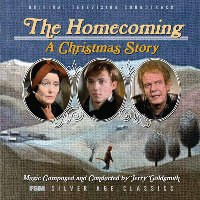- The Homecoming composed by Jerry Goldsmith
- Rascals and Robbers composed by James Horner
- Film Score Monthly / 2011 / 20:16 + 34:29
Pretty much all of the great film composers have at some stage or other worked in television – often at the beginning of their career while making a name for themselves, sometimes for special projects once they had already made their name. For whatever reason, the 1970s saw a number of the greats working extensively in television – John Barry, Jerry Fielding, Elmer Bernstein – all doing a lot of tv. None did more than Jerry Goldsmith, established by the end of the 1960s as one of the foremost film composers and yet scoring countless tv movies and even weekly series in the 70s. I don’t know what led to this – but try to imagine Thomas Newman scoring weekly episodes of Desperate Housewives or something and that’s how unlikely this seems to me now, looking back.
One of the most famous series the great composer worked on during that decade was The Waltons. It actually came about following the incredible success of a 1971 tv movie (never intended as a pilot for a series), The Homecoming, which is what’s on this album. It was one of twelve television projects the composer worked on in the two years following the release of Patton in 1970. The brief score is absolutely wonderful – intimate Americana, played by a very small ensemble which highlights harmonica and guitar. It’s a style Goldsmith worked in several times in the late 60s and early 70s – anyone who loves things like The Flim-Flam Man (and I do believe that everyone loves things like The Flim-Flam Man – there’s a rumour about an old woman in Papua New Guinea who’s not sure, but I’m not inclined to believe it) will be in heaven.
There’s a beautiful main theme, for starters. It’s not the theme you know from The Waltons (an old interview with Goldsmith is quoted in the liner notes where he says he has no idea why they asked him to come up with a different theme for the series – but that “it came to me in the shower”). That theme’s the highlight, but the composer packs so much delightful music into a score which is only twenty minutes long, it is hard to resist the temptation to simply play it all over again once it’s finished. I love this soft, intimate side to the composer – one for which he is rarely praised, given how much everyone loves his action music.
The album’s second score is another tv movie from a major film composer, this time in different circumstances – James Horner wasn’t (quite) yet a major film composer at the time he scored Rascals and Robbers, a Mark Twain-inspired children’s adventure story. I’d never even heard of it, it wasn’t even well-received at the time, but here we are with the soundtrack, almost thirty years on. Horner recorded the score immediately before starting work on the film which was to launch his career, and which remains his masterpiece, Star Trek II. Somewhat improbably, there are certain characteristics of this score which would find their way into that, particularly the action music.
That style is mixed with Horner’s own brand of Americana – it’s not exactly intimate like Goldsmith’s in the previous score, but is still beautifully soft and colourful. Again, there’s a great main theme, initially heard for solo trumpet. It’s a kind of nostalgic, adventurous melody which seems to be yearning for the good old days – of course it is, the film’s about Tom Sawyer and Huck Finn! But while that may be predictable, the full-bodied action music later on does not (Horner makes his 37-piece orchestra sound enormous at times). Fascinating to hear him honing his techniques – and ticking off parts of later, classic scores as they crop up here!
It’s certainly not all warm and cosy, this one – it turns very dark and eerie towards the end (as befits tracks called “In the Cave”, “Den of Snakes” etc) – Horner making very clever use of a bass harmonica to produce a very unsettling effect. The score as a whole is perhaps a little incoherent, but again there’s quite a lot packed into a relatively brief running time. For a Horner fan, it’s great to hear this very early music unearthed, remarkable just how assured he was even then. He was 28 when he conducted this music on a big Hollywood soundstage – truly astonishing when I think what I was doing when I was 28. This is a fabulous release from FSM – essential for fans of both composers. I’m not sure quite how pleased Goldsmith would have been to find himself sharing a bill with Horner – but for these two scores, it’s a pairing which makes perfect sense. ****














What strikes me is how Horner can take such a small orchestra and make it sound twice as large as it is while modern composers take such huge orchestras and make them sound twice as small as they are. I feel like something’s quite backwards there.